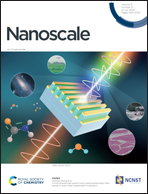The ruthenium complex assists in nuclear targeting and selective killing of tumor cells†
Abstract
In clinical studies, the toxicity of platinum-based antitumor drugs limits their use. DNA is the most widely studied target of metal-based complexes. Thus, nuclear targeting and selective killing have become the purpose of ruthenium complex design. We synthesized a carboline derivative and its ruthenium complex, NBD and NBD-Ru, and characterized their properties. UV spectra were used to monitor their stability. Transmission electron microscopy and dynamic light scattering were used to identify the self-assembly properties. Inductively coupled plasma mass spectrometry was used to assay the distribution of the Ru complexes in cells with or without transferrin. Besides, the tumor cell killing activities with or without transferrin were detected by MTT assay. An imaging flow cytometer was applied to observe the fluorescence further to identify the cellular distribution. The effects of NBD and NBD-Ru on DNA and the cell cycle were also measured. In vivo, the antitumor and antimetastatic activities of NBD and NBD-Ru were assessed in S180 and LLC tumor-bearing mice. We found that introducing Ru improved the solubility and stability, enabling NBD-Ru to self-assemble into nanoparticles with the EPR effect. At the same time, binding affinity with transferrin increased significantly after complexation, meaning NBD-Ru could target and selectively kill tumors via Tf/TfR pathway. More interestingly, ruthenium assisted the complex in achieving nuclear penetration, which can kill tumor cells by interacting with DNA. In vivo experiments further verified our conclusion in vitro. NBD-Ru could inhibit not only the growth of a primary tumor but also lung metastasis, which was related to the killing effect of the complex on tumor cells (Ki67) and inhibition of neovascularization (CD31). At the same time, the systemic toxicity of the ruthenium complex in vivo was reduced because of the targeting effect, and the biosafety was improved. In conclusion, we found that ruthenium assisted in nuclear targeting and selective killing in vitro and in vivo.



 Please wait while we load your content...
Please wait while we load your content...